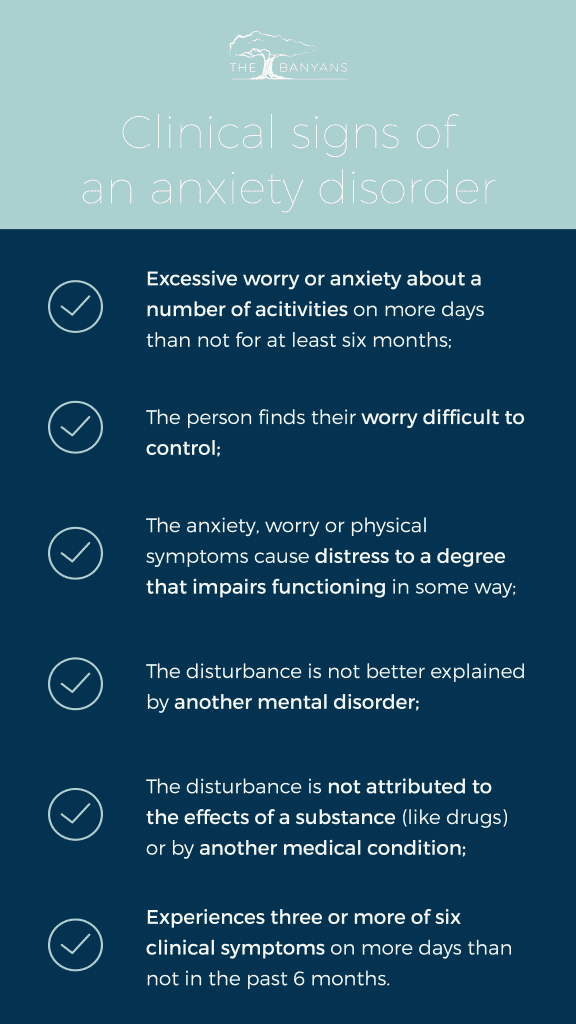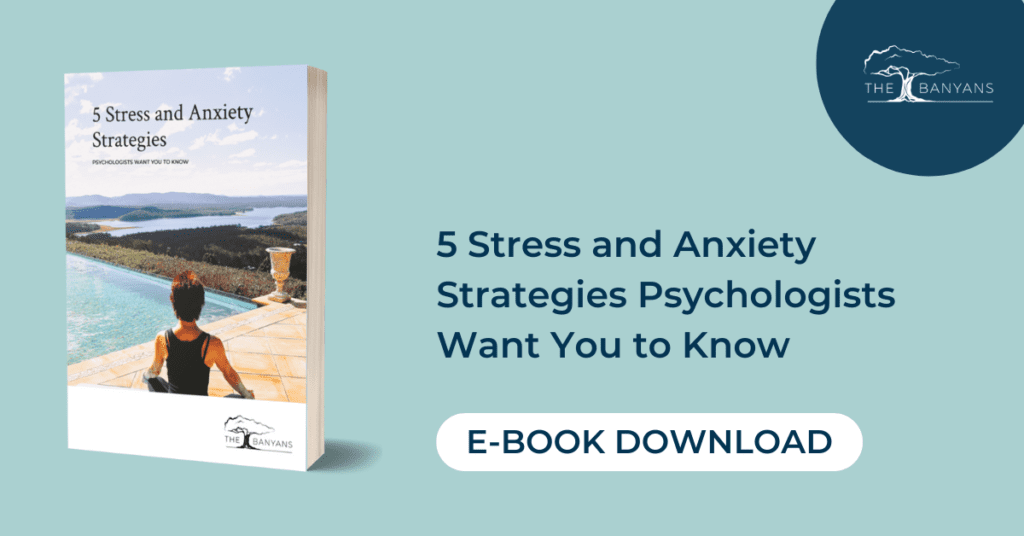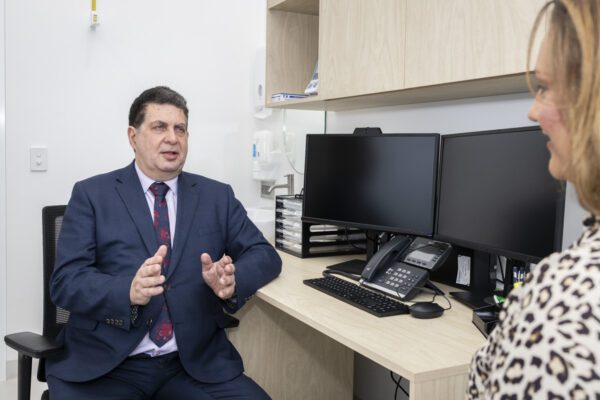Anxiety disorders are among some of the most common mental health conditions in the world, with one in four people experiencing diagnosable anxiety at some stage in their lives. How do you recognise the signs of anxiety? What makes an anxiety disorder different from a normal amount of fear or nervousness?
You may find this article helpful if you are…
- Potentially experiencing an anxiety disorder;
- Interested in learning more about the signs of anxiety disorders;
- Curious about the different types of anxiety conditions, such as generalised anxiety disorder, social anxiety or obsessive compulsive disorder (OCD);
- Seeking a rehab program for anxiety.
What are the signs of anxiety?
Many of us can relate to the benefits of our fight or flight response: our body’s natural response to fear. It’s what makes us run fast from a threatening animal or concentrate our focus under pressure. A suitable amount of anxiety is why we may become nervous on a first date or for a job interview.

Anxious feelings may look or feel like:
- Butterflies in your stomach;
- Shaking or trembling of your hands;
- Lack of eye contact or “jumpy vision”;
- Fidgeting or wiggling on the spot; or
- Clammy or sweating skin.
But not everyone who feels anxious or nervous from time to time has a diagnosable anxiety disorder. What’s the difference?
What is anxiety?
Everybody experiences stress – it’s inevitable. Stress is a response to an external cause – potentially conflict, a tight deadline or a busy day. Often, stress dissipates when the issue is over and we can continue with our lives.
Anxiety is a natural response to stress, uncertainty or danger. We experience healthy doses of anxiety every day! It designed to put you on alert and to keep you safe.
Although we can’t avoid it, anxiety a normal feeling that should come and go.
Many of us can manage our day-to-day anxieties with little conscious effort. But for those who are experiencing an anxiety disorder, it can be more challenging to manage. Perhaps the feeling of anxiety stays long after the stressor has passed, or maybe we feel an excessive amount of worry.
What is an anxiety disorder?
An anxiety disorder is when these normal feelings are consistent, overwhelming or without reasonable cause.

According the DSM-V, an anxiety disorder a diagnosable psychiatric condition, experienced by a quarter (1 in 4) of all Australians at some stage in their lifetime. Although the condition seems to affect more women than men, there isn’t yet a clear explanation as to why this is.
An anxiety disorder has a significant impact on our day-to-day functioning, and can make it difficult to enjoy life.

Related: Alcohol, anxiety and Australian women
Do I have an anxiety disorder? Signs of anxiety disorder
For a clinical diagnosis of an anxiety disorder, there are six main criteria that must be met. These criteria address the frequency and intensity of feelings, but also the absence of other potential diagnoses.

The signs of a clinical anxiety disorder include:
- Excessive worry or anxiety about a number of activities, on more days than not for at least six months;
- Feeling like it is difficult to control the worry;
- Impaired functioning in normal day-to-day activities due to anxious thoughts or physical symptoms;
- Absence of other more suitable explanations, such as alternative mental health disorders, substance use or other medical conditions; or
- Three or more of the following symptoms on more days than not, for a least six months:
- Feelings of restlessness or “on edge”;
- Fatigue or insomnia;
- Difficulty concentrating or maintaining focus;
- Irritability;
- Muscle tension;
- Difficulty falling or staying asleep.

Identifying the signs of anxiety in your loved one
It can be difficult to identify the physical or emotional signs of anxiety in those you care about. Therefore, it may be easier to identify these four signposts that point towards an anxiety disorder, rather than specific symptoms.
Common stressors
People with an anxiety disorder may refer to a set of common experiences or environments or seasons that “trigger” their feelings of anxiety. For example, someone may experience worsened anxiety around Christmas time or before an exam.
However, an anxiety disorder may have no rhyme or reason. If feelings of nervousness, fear or anxiety seem to “pop up out of nowhere”, we may be experiencing Generalised Anxiety Disorder (GAD).

The intensity of symptoms
When someone is experiencing an anxiety disorder, the intensity of their feelings can be greater than normal. Rather than being nervous about their first day at a new job, a person experiencing anxiety may feel overwhelmed with nerves most days.
In the case where someone also experiences anxiety attacks, the symptoms may gradually build until they cannot cope. If you are witnessing your loved one experiencing intense symptoms of distress, they may be experiencing an anxiety disorder.
Related: 5 strategies to reduce anxiety
Duration of episodes
The duration of these feelings may provide a clue as to whether someone is experiencing an anxiety disorder. Although a certain amount of anxiety, fear or nervousness is normal in life, if these symptoms continue once the stressor has passed, your loved one may be experiencing an anxiety disorder.
Impairment on every day life
One of first noticeable signs of an anxiety disorder in someone you care about is the effect their anxious thoughts and behaviors have on their every day life. Perhaps they begin showing lateness, apprehension about certain events, or withdrawing from every day life.
Other common impairments you may notice are difficulty concentrating, reduced productivity and increased mood swings.
5 Stress and Anxiety Strategies Psychologists Want You to Know
Download our free management guide.

Developed by qualified psychologists, this e-book goes through 5 actionable strategies you can implement to manage the stress and anxiety in your life.
Download the free e-book today.
Anxiety doesn’t have to rule your life.
If you are experiencing the symptoms mentioned, you might be experiencing an anxiety disorder. The good news is that there is help available, and you don’t have to let an anxiety disorder ruin your life. You deserve to experience freedom from the signs of anxiety.
The Banyans Health and Wellness is a private treatment centre for those experiencing an anxiety disorder and other co-occurring conditions.
Our holistic approach incorporates medical, psychological, and natural therapies to ensure we provide the highest standard of research based treatment and support.
Take the first steps towards an anxiety-free life.
The first step to regaining your courage is to make an enquiry to The Banyans. Our friendly team are willing to answer all your questions by phone or email.
Your life is waiting for you. Take the first step today.







